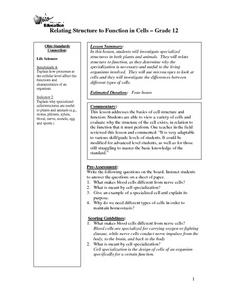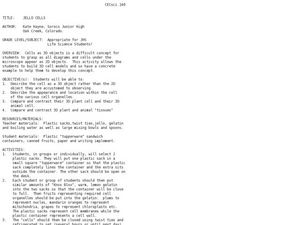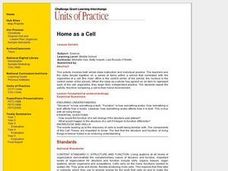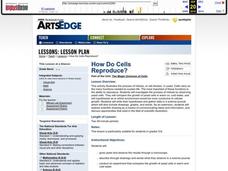Curated OER
Never Say Die: The CLock of Life
Students explore ways to turn back the genetic clock. They explore cells and mitosis. Students participate in an activity to create a flip book that will animate the process of mitosis. They explain each stage of mitosis.
Curated OER
Community Cell
Students explore parts and functions of the cell, and create models of assigned organelles.
Curated OER
Charlie and the Cell City
Students investigate the major components of the cell and their function through an adventure inside the cell with an imaginary little guy named "Charlie." Through the use of the Internet and viewing a video, students identify components...
Curated OER
Cells
Students explore the cell and cell processes. They create "cytoplasm", make a model of the cell and its organelles, and simulate the osmosis and the diffusion of materials into and out of the cell.
Curated OER
Bread Cells
Fifth graders examine plant and animal cells. In this plant and animal cell lesson, 5th graders define what cells are, label their parts, and describe how plant and animal cells are different. They observe cells at a number of web sites,...
Curated OER
Relating Structure to Function in Cells
Twelfth graders investigate specialized structures in both plants and animals. They relate structure to function, as they determine why the specialization is necessary and useful to the living organisms involved. They use microscopes...
Curated OER
Jello Cells
Students create a three dimensional model of a cell. In this cellular structure lesson, students use gelatin, plastic bags, plastic containers, and fruit to construct a model of a cell. They compare the cells structures and stack them to...
Curated OER
What Is Life?
In this life characteristics worksheet, students answer 16 questions about living things, Redi's experiment, basic needs, growth and development.
Curated OER
Cells: Nature's Building Blocks
What you will find on this page is the general outline of a unit on the use of a microscope and the structure of the cell. There is no actual educational content here, so you will need to design the details of each of the four student...
Curated OER
AP: Chapter 26: Origin of Life
Five pages take biologists on a generalized survey of the origin of life. Queries are made regarding theories of how life developed, ancient Earth conditions, and the ever-changing field of taxonomy. The experiments of different...
Curated OER
7.012 Fall 2004 Section Self-quiz
This quiz just looks neat! It has two cell diagrams for biology class members to label. They also describe the function of each organelle. A prokaryotic and eukaryotic cell are displayed for them to compare, and then they fill in the...
Curated OER
Biology: Cells and Chemical Changes
Students explore the numerous functions of cells in both plants and animals. Following a pre-assessment, they construct cell models and examine onion cell slides stained with iodine or dye. After participating in experiments on how to...
Curated OER
Cell Study
Learners (females) are introduced to the cell. They discuss what a cell is, and students define what a cell is. Learners comprehend that all living things are made up of cells. They comprehend that life is defined as something that...
Curated OER
Life Cycle - Human Biology
In this life cycle worksheet, 9th graders complete 3 different procedures that distinguish viruses and bacteria and inherited characteristics. First, they read the background excerpt given about bacteria and viruses. Then, students cut...
Curated OER
Cell Structure and Function
Students discuss scientific advances brought about by the Mars Surveyor Space Program which impact on daily life, identify laboratory apparatus like microscopes, slides and coverslips, and use the microscopes to view cells and organisms.
Curated OER
Home as a Cell
Middle schoolers correlate a series of items with the organelles of a cell. They compare the school to a cell, and create a drawing that compares the cell structure with their home.
Alabama Learning Exchange
Edible Cell
Students identify cell parts and their function. In this animal cell lesson, students view a video clip and discuss cell components. Students create an edible replica of an animal cell using food items.
Curated OER
The Cell
Students study the basic processes by which cells divide and transfer their genetic information. They recognize and distinguish possible inherited traits and through the discovery method of the facts and principles of inheritance. this...
Curated OER
The Physics of Cell Phones
Students explain how cell phones work. In this physics activity, students describe the advantages and advantages of having one. They identify the different parts of a cell phone.
Science 4 Inquiry
Do You See What I See?
In only nine months, a small group of cells grows into a fully developed baby. Pupils learn about the development of an embryo to a fetus to a baby. They identify each step of weekly development. Young scientists look at ultrasounds to...
Curated OER
This is Jeopardy: Fifth Grade Life Science Review
This PowerPoint provides a Jeopardy game board and science questions from a variety of topics including biomes, plants, life cycles, cells, and the water cycle.
Curated OER
Dissecting Frog Embryos: Cell Membranes and Mitosis
High schoolers use high powered dissection microscopes to dissect and examine frog embryos as well as see balls of cells that were produced by rapid division. The concept of mitosis links to the lesson.
Curated OER
How Do Cells Reproduce?
Beginning biologists prepare a sugar solution for yeast cells to live in, and divide it into two different jars. Samples from each jar are viewed with a microscope, and then one jar is placed in a warm environment and the other a cold...
Curated OER
Energy and Life
This two-page quiz mostly covers ATP, but touches on autotrophs and heterotrophs, as well. Learners show what they know through multiple choice, fill-in-the-blank, and short-answer questions.

























